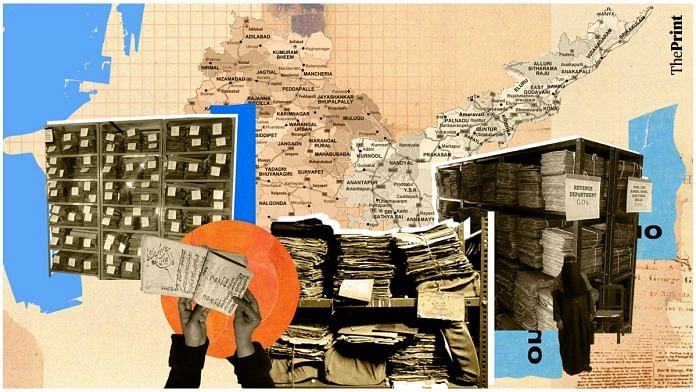In Hyderabad, the archives are fighting.
History has two claimants – the Telangana State Archives and the Andhra Pradesh State Archives. The state of Andhra Pradesh was split into two a decade ago. But it’s been tougher to carve up the region’s history into two uncontestable halves.
It’s a tug-of-war, and each state is pulling at the brittle papers of the past. “Whose history?” is at the heart of this war.
The walls of the Telangana State Archives, like the documents they house, are crumbling. A leaky pipe drips water into a bucket outside the director’s office. Centuries-old fraying records in Persian and Urdu lie exposed in dusty, dark, cramped rooms. And 300 kilometres away, across state borders, the director of the Andhra Pradesh State Archives sits in a largely empty but shiny new building. His spanking new office is surrounded by rooms he has yet to fill. He is waiting for the archival papers to arrive from Telangana, which refuses to part with them.
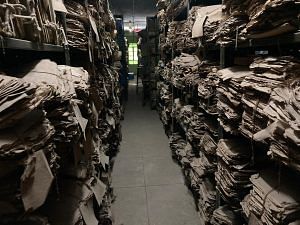
And what’s at stake is the history of modern Hyderabad.
They are at loggerheads over land records and government orders from the Nizam’s government between 1948 and 1956 — documents that form the foundation of the erstwhile city that was once Andhra Pradesh’s capital. The bone of contention is the brief overlap between when the state of Hyderabad acceded to India and when the state of Andhra Pradesh was created. And both Andhra Pradesh and Telangana have staked their claims on these records.
But it’s not just about history. It’s about language, religion, and the cultural identity of two fiercely proud traditions — embodied by the directors at the helm of both archives, V. Ranga Raj and Zareena Parveen. The two used to work as close colleagues in an unbifurcated Andhra Pradesh, but the split between the states in 2014 has forced them into separate corners, fighting over the remains of the day.
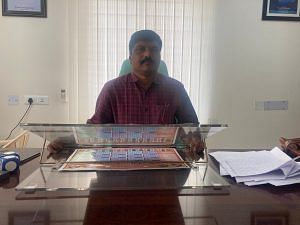
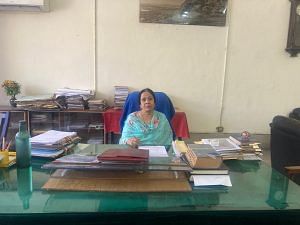
“We had a cordial and correct bifurcation, we did,” says Zareena Parveen, director of the Telangana State Archives. “But how can I split the archives in half? It’s not their history. It’s our history. It’s the history of Hyderabad and the Deccan.”
Expert committees were set up, the records have been categorised, the transfer list has been prepared, and contracts have been signed. A memorandum of understanding, endorsed by the two directors in 2018, promises “mutual cooperation.” Seven out of the 12 agreed-upon categories of records have even travelled in trucks from Hyderabad, Telangana, to their new repository in Mangalagiri, Andhra Pradesh.
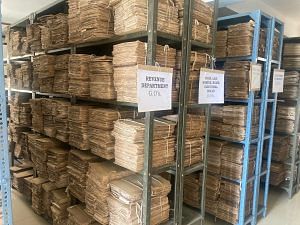
And yet, nearly a decade later, the two states have not yet managed to fully separate their histories. And not even decide what belongs to who.
Also read: Vidita Vaidya, the neuroscientist helping us understand how brain functions under stress
What the archives are fighting over
The period between 1948 and 1956 — when the last Nizam of Hyderabad, Mir Osman Ali Khan, ruled — is what’s contested.
Government orders and land records from this period came with multiple copies, as was customary for farmans (an order or command) from the Nizam’s government. Telangana maintains the right to hold on to these originals, and Andhra Pradesh can have their digitised version. Andhra Pradesh says they should have them too — if not, at least the first copies of the originals.
The Telangana archives contain important documents from eras such as the Mughal period and the Nizam’s governments. Examples include documents of a Muslim freedom fighter dead set against the Partition of India, or farmans like the Nizam sanctioning Rs 1 lakh to Banaras Hindu University in 1939, or an 1876 order banning sati practice in Hyderabad state.
“All these documents are in Urdu or Persian anyway,” said Parveen, an accomplished and renowned scholar of both who has also written extensively on the archives’ Urdu and Persian records. “We have language specialists here. They won’t be of much use over there in Andhra,” she said, referring to the predominance of Telugu and the Telugu script in Andhra.
Of the 43 million documents at the Telangana State Archives, 85 per cent of the records are in Urdu and Persian — the oldest being a Bahmani era land grant from 1406. There are also Mughal-era documents from the reigns of Shah Jahan and Aurangzeb.
“Our archive is a gold mine. People have no idea what khazana (treasure) is here,” said Parveen, raising her eyebrows suggestively. Her counterpart in Andhra Pradesh is certainly aware of this, having worked at the same archive with her for decades.
The jewel in the Andhra Pradesh State Archives’ crown is the personal letters of a man whose storyline was nominated for a Golden Globe. The diaries and letters of revolutionary Alluri Sitarama Raju, on whom the historical film RRR was based, squarely belong with the Andhra Pradesh State Archives. Telangana is not fighting to keep them. This is because they are in Telugu and largely confined to one of Andhra Pradesh’s 13 districts and do not intersect with one of Telangana’s 10 districts.
“It’s public property,” says V. Ranga Raj, spreading his hands leaning back into his leather chair. “Earlier we were working together, now there are quarrels. So it was difficult when bifurcation happened. We became dependent on them — because our records are there!”
Also read: ‘Mathura isn’t Kashi’: BJP plan to develop Bankey Bihari temple area has riled up Hindus
There’s no template
But Andhra Pradesh getting its own archive is an anomaly.
The state archives of other reorganised states, like Bihar, Jharkhand, Madhya Pradesh, and Chhattisgarh, have not fought this battle.
“Being the parent state of Bihar and Jharkhand, Bihar keeps all the records,” said Suman Kumar, the director-in-charge of the Bihar State Archives. But what complicates the matter here is that Hyderabad was the capital of the erstwhile parent state Andhra Pradesh, and is now the capital of the new state Telangana. Hence the tussle over the documents.
Bihar is one of the few Indian states with a Public Records Act, introduced in 2014, and it states that no public records are to be transferred from their repository. Kumar pointed to the difficulties of transporting fragile documents and said that if scholars or the Jharkhand government require documents, they can travel to Patna to access them. Plus, before the state was bifurcated, Ranchi had a regional record office. This office has retained its records and is now Jharkhand’s official archive.
The case is similar in Madhya Pradesh and Chhattisgarh. There have been copies carried to Raipur, but all the originals have remained in Bhopal, according to Kadam Singh Mena, a staff member at the Madhya Pradesh State Archives. According to a recent news report, the Madhya Pradesh State Information Commissioner Rahul Singh called for state legislation to be introduced to protect public records, reportedly after frequent complaints of missing documents.
Part of the issue, according to archivists, is that the newer states, carved out of their parent state, are not requesting records for their own archive.
The way that Andhra Pradesh and Telangana choose to proceed might just be the blueprint for further regional conflicts over history.
Also read: YouTube new playground for Indian cricket fans. Here Kohli can score 100 against Pakistan
The cultural split
An overwhelming feeling of resentment was one of the driving factors behind Andhra Pradesh’s split in 2014. Those from Telangana felt that people from Andhra Pradesh enjoyed supremacy in the state and were using the state’s resources to line their own coffers.
Parveen and Ranga Raj are now the joint record-keepers of the region’s history. But the protracted demands of the state split are playing into who gets which history and whose history is a priority to them. One sees it as the history of the Deccan; the other sees it as the history of the Telugus.
So when it came to the question of who would succeed Parveen as director of the Telangana State Archives in 2015, the burning backdrop of bifurcation dictated the decision. Next in line was her deputy director, Ranga Raj — a man from Andhra Pradesh.
He never got the promotion. Parveen stayed in the post. And the decision created a fissure that still hasn’t healed. The person who used to report to her and even called her ‘Akka’ (elder sister) is now making his own demands.
Ranga Raj got his due when the archives were officially split in 2018. He moved to Mangalagiri and took charge of the five-storey building that now houses four other Andhra Pradesh government offices. The archives moved into the building first and have two entire floors to themselves. The building is surrounded by sprawling fields in a town that doesn’t seem like it headquarters important state offices.
It’s a far cry from the dilapidated Telangana archive building in Tarnaka in Hyderabad, on a 99-year lease from Osmania University.
Ranga Raj visits his old workplace regularly — he estimates once every three months. He last visited in early December 2022. He travels to oversee the transfer process of the remaining records and catch up with his old colleagues and friends. He has to maintain a good relationship with them, he said, so that the transfer process goes smoothly. He’ll catalogue everything once the transfer is complete and take stock of the condition of the records.
“Andhra-Telangana feelings were there, but it won’t stop the work from happening,” said Mohd. Abdul Raqeeb, assistant director of the Telangana State Archives. He’s on excellent terms with Ranga Raj, and the two stay in frequent touch. Raqeeb is more heavily involved in the day-to-day aspects of the transfer and keeps tabs on its progress. All documents after 1956 — officially common property between the two states — need to be copied and sent to Andhra. The process hasn’t begun yet because neither state has the budget for it.
Andhra Pradesh and Telangana decided to split all their assets in a 52:48 ratio. But the directors are struggling to apply this to the regions’ intangible history. And what’s more is that they feel this is still inequitable. Ranga Raj feels entitled to more records, but the new state of Andhra Pradesh is home to five regional offices – in Tirupati, Anantapur, Vijayawada, Rajahmundry, and Visakhapatnam – while Telangana was allocated only one. It’s one of the reasons why Parveen is fighting so hard to keep what’s in Hyderabad.
The staff of the archives, like every other state asset, were also split in a 58:42 ratio.
The total posts the archives were authorised to have was 180, of which 104 went to Andhra Pradesh and 76 were retained by Telangana. The Andhra Pradesh Archives currently has only 11 permanent staff, of which only four are in Mangalagiri, and the remaining seven are posted across different regional centres. The Telangana Archives currently has 36 permanent members of staff.
Funding is also an issue. In February 2022, the Telangana government sanctioned Rs 1 crore for the digitisation of records. The Archives also recently signed an MoU with the Government of Iran to bind and preserve older documents and to digitise microfilm.
“Telangana is our state, we can’t betray it,” said Parveen, who’s seen by her staff members as synonymous with the institution she heads. “Andhra left this state. It has not left its history behind, why must it take ours?”
Also read: Rose, sandalwood, petrichor—Gulabsingh Johrimal that captured Mughals with ‘Indian’ scents
Fake files, forgeries, false claims
The contested documents are important because they detail the formation of modern Hyderabad and, at the very least, are necessary to maintain an accurate record of land ownership.
The archives have a meandering history. They’re a mishmash of several different archives, which is why they’re difficult to separate today. The Mughals, who administered the Deccan from Aurangabad, set up their own archives in the region, which came to be known as the Daftar-i-Diwani. Then, all Telugu language records were transferred from the colonial archive of the Madras Presidency to Kurnool in an attempt to separate them on a linguistic basis. These two archives were brought together as the Central Record Office in 1950, under the Nizam’s government in Hyderabad. It became the Andhra Pradesh State Archives in 1956, after the formation of Andhra Pradesh. The records were only officially divided in 2018, four years after the bifurcation was finalised.
At play here is a tinge of Telugu pride history that is colliding with Telangana history and Madras presidency history before that. Disentangling one from the other is not just a bureaucratic exercise by two officials but one with heavy emotional investment for people of both states.
“The documents that belong to Andhra region have been shifted here (to Mangalagiri) — around 50-60 per cent is complete,” said Ranga Raj. According to him, all the documents transferred from the Madras Presidency, plus all the records from 1956 to 2018, belong exclusively to Andhra Pradesh.
Parveen would disagree. The period from 1956 to 2018, according to her, should also be considered the history of Telangana, and the original documents from 1948 to 1956 should stay within Telangana because these documents were the property of the Hyderabad Central Records Office.
Land-related documents, which form the bulk of this contested property, aren’t only of interest to scholars and academics. They are also sought out by activists or citizens seeking to resolve disputes, investigate histories of claims, or bolster their claims. Even state agencies like the Waqf Board are interested — they’re regular visitors to the archives, looking for documents that would have declared a certain parcel of land as waqf (endowment made to a charitable, educational or religious cause).
What’s more is that this period coincides with when Hyderabad was placed under military administration. Major General JN Chowdhury was appointed Military Governor over Hyderabad after the state was formally annexed to the Indian Union in 1948. Chowdhury had led Operation Polo, and stayed in this post until 1949. Mir Osman Ali Khan, the last Nizam, headed the state as Rajpramukh from 1949 to 1956.
It’s especially relevant in modern Hyderabad, a historical city that’s been developing fast into a technological and infrastructural hub in India. There were fears about the bifurcation dulling Hyderabad’s shine. Instead, the past decade has seen it become one of India’s most expensive residential markets, with global giants like IKEA and Lockheed Martin choosing the city as their base.
Also read: What reports on Indian women’s falling participation in labour force don’t tell you
Issues with infrastructure
Ranga Raj has that rare opportunity most archivists dream of – building an archive from scratch in the way he wants.
The Andhra Pradesh State Archives are ready to fling open its doors — to scholars and records alike.
It’s no surprise that its director is trying to invigorate the archives and set a new standard in stone. The records that have made their way to Mangalagiri are all neatly organised and stacked, with the more delicate and brittle records preserved in anti-acid boxes or between wooden planks.
The repository’s rooms are divided by district and type of record. Papers from the current Andhra Pradesh administration have already started arriving, dumped in one big room and sorted in real time. There are no reading rooms yet, and scholars are yet to arrive at the new, remote location. Only two foreign scholars have reached out to the archive since 2018 to enquire about records, while a few from nearby universities have visited.
Ranga Raj even prepared legislation to preserve public records, which he hopes will be introduced in the Andhra Pradesh assembly in February 2023 by education minister Botsa Satyanarayana. He has not shared a copy of this law with his counterparts in Telangana — it’s his hard work, after all.
He has contracted staff to come work with him. They are all college graduates but not specially trained in preserving records. Ranga Raj and the more senior members of staff try to provide them with training every three months. Across state borders, the staff in Telangana are languishing — many of those left working there have been there for decades and have only seen their workplace descend into more and more chaos.
“Because of the bifurcation, the staff has also gone,” said B. Eswara Rao, associate professor at Hyderabad Central University who was using the Telangana archive to access public health records. “And the people working here don’t know about record-keeping. There are no proper facilities to sit and read also.”
The staff and scholars both agree that the archives are not a priority for the state government — both in Andhra Pradesh and Telangana. It’s because the archives are a service-oriented department that does not generate revenue, according to Ranga Raj. Staff are contracted at both archives and have been so for years. The measly three-member team that looks after Persian records at the Telangana archives still doesn’t have permanent jobs, despite being part of a dwindling number of experts who can handle such documents.
Scholars have noticed this too. Indivar Jonnalagadda, PhD scholar at the University of Pennsylvania working on the intersecting politics of citizenship and property in Hyderabad, remembers a staff member telling him that “while the two states were vying for items in the collections and archives, neither state was taking ownership of the institution or the infrastructure. So bifurcation only aggravated the situation of the archives, which was one of resource and staff scarcity.” He added that it’s not clear to him what value contemporary governments give to archives. “From a right to information and a scholarship perspective, I think the greatest need of the archives is investment into infrastructure and staff and continuing collections. I don’t think that is on any government’s agenda,” Jonnalagadda said.
There have also been allegations of bureaucrats and businessmen stealing papers to forge or use to their own benefit — the archives are rife with rumours.
Rajan Das, building superintendent of the Telangana State Archives, acknowledged these rumours, but said that it’s not something they have the capacity to address right now. “Dust is our biggest enemy!” he said, staring wistfully out his large window framed with peeling plaster and water-stained walls. “It’s a tough task. We don’t have the technology or the knowledgeable staff to properly maintain our records. In the meantime, we have to make sure this building is up and running.”
He has two permanent staff members who work with him. In mid-December last year, a portion of the ceiling in the Persian record room fell down. The tables with open, exposed records had to be hurriedly rearranged, and the dust was neatly swept to the side. The staff are used to making do. During the monsoons, rain floods the ground-floor rooms, and water seeps into the damp walls.
Also read: Pedigree dogs are India’s new therapists. ‘Rent-a-dog’ latest business on the block
Curiosity and comparison
Both archives are understaffed and underfunded. Both are run by former friends committed to the purpose of preservation.
And everything in the archives — from the records to the staff — is caught between them. “Andhra Pradesh and Telangana are like siblings. But sometimes working here is like working between India and Pakistan,” jokes one staff member in Hyderabad.
Everyone in Hyderabad is interested in the new office run by their former deputy director. They’ve all heard how fancy and modern it is, even if it is in the middle of nowhere. The envious questions they ask are less about how the records are being organised and preserved and more about the size of Ranga Raj’s office or the funding he’s received. One worker asked about how much rent the archives have to pay for their two floors.
But despite the curiosity, no one from Hyderabad has actually gone to visit Mangalagiri. It’s only a five-hour road trip, but the two archives behave as if they’re separated by centuries.
Ranga Raj and the Andhra Pradesh State Archives have invited Parveen and the Telangana State Archive multiple times to come and visit. But they’ve never visited. Her work, Parveen says, is to hold the fort in Hyderabad.
This article is part of a series on the state of India’s archives. Read all articles here.
(Edited by Tarannum Khan)


